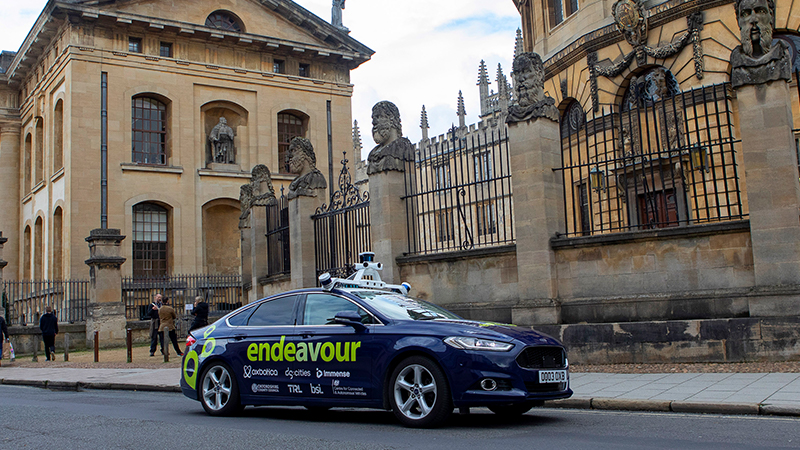Summary
TRL was a key participant in Project Endeavour, which was a collaborative, consortium-led project, part-funded by the Centre for Connected and Autonomous Vehicles (CCAV) and delivered in partnership with Innovate UK. Project Endeavour was a mobility project designed to fast-track the introduction of automated vehicle (AV) services across the UK and maximise the potential of this new technology to shape the future of mobility.
The project was launched in mid 2019 and completed in autumn 2021 with pilot trials of live services in London, Oxford and Birmingham. The pilots demonstrated AVs in real-world urban environments and helped the local authorities for each trial prepare for future implementation.
The Challenge
TRL focused on two challenges as part of Project Endeavour – developing a consistent method for safety assurance of CAV trials and testing, and exploring the feasibility of running trials of autonomous vehicles which are entirely operated and supervised remotely.
Safety Assurance of CAV trials and testing
A safety case is a structured argument, developed by trialling organisations and supported by evidence, that a trial or testing is safe. It promotes safety during technology development, minimises the risk of incidents on the road and provides assurance to stakeholders.
BS PAS 1881 details the requirements for an operational safety case for automated vehicle trials and testing. The challenge for TRL was to support BSI in developing and implementing an assessment methodology to evaluate an operational safety case against BS PAS 1881 requirements. Through developing a certification scheme against the PAS 1881 standard, the aim was that confidence in CAV technology will increase and the certification scheme can operate on a larger scale, both in the UK and globally.
Additionally, TRL conducted stakeholder engagement with a range of stakeholders that are involved in CAV trials including testing organisations, local authorities, road authorities, test bests and insurers. The purpose of this engagement was to establish the market requirements for tools or services which will enable stakeholders to demonstrate/oversee safety assurance on trials in order to meet the requirements of BS PAS 1881 and other relevant standards. Once market needs were established, TRL developed both a business assurance package for testing organisations and a high-level safety assurance package for stakeholders required to give permission to testing organisations for trials. Within the safety assurance package, we aimed to create a software tool that can be used to guide and support stakeholders (for example, local authorities and insurers) when engaging with the testing organisations, to ensure a consistent approach to safety case acceptance. The guidance documents produced are:
Assuring the safety of CAV trials on the public highway - Guidance for Trialling Organisations
Assuring the safety of CAV trials on the public highway - Guidance for Insurers
Assuring the safety of CAV trials on the public highway - Guidance for Highways and Local Authorities
The software tool can be seen demonstrated during this event recording:
Remote Operations
Currently, trials and testing of connected and automated vehicles generally requires two people within each vehicle – the safety driver and the automated control system operator (ACSO). As we progress to more advanced trials, it is important to understand what is needed to remove these roles from the vehicle, without compromising safety. The challenge is to first understand how the role of the ACSO can be performed remotely and then apply that learning to the safety driver role.
TRL conducted a feasibility study to understand the roles of ACSO and safety driver in controlling a CAV, including current relevant standards, and the key risks and enablers of making these roles remote from a CAV. This work will create an understanding of the technical challenges involved in removing the ACSO and what is required to progress to advanced trials, as well as creating a basis for future requirements needed to remove the safety driver from the vehicle.
The summary project report for this work can be found here. (31 pages)
The full report is available here. (131 pages)
Updates
Read more about TRL's work on developing assurance standards and guidance for AV trials in our blogs:
- Safety assurance and AV trials
- Remote operator training – why now is the time to set standards for the future
In this video the consortium members describe the project and their role.
The road trials
If you missed the chance to participate in the road trials, you can see get a taste of the experience by watching these videos. Open the links to the videos below, go full screen, and use the cursor on the top left hand side to navigate.
Project Endeavour: Self-driving ride around Oxford in VR
Project Endeavour - A glimpse into tomorrow
DG Cities' report into consumer perceptions of safety and AV services is here.
Note - if you can't see any videos playing on this page, try using a different browser.

